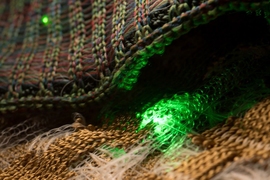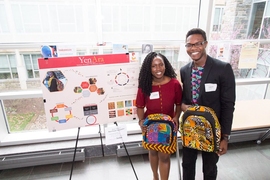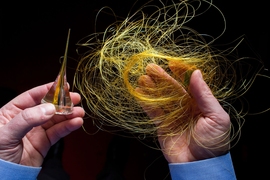Yoel Fink stands under an unassuming LED ceiling lamp wearing what appears to be just an ordinary baseball cap. “Do you hear it?” he asks. Semiconductor technology within the fibers of the hat is converting the audio encoded in light pulses to electrical pulses, he explains, and those pulses are then converted to sound. “This is one of the first examples of an advanced fabric. It looks like an ordinary hat but it’s really a sophisticated optical communication system.”
Fink and his team are shaping a new destiny for fabrics. Clothing as a communications system: A hat that picks up light transmissions and converts them to sound can hold life-saving potential. “Think about pedestrian safety and self-driving cars. Tremendous investments are going into cars. How about the pedestrians? Do we as pedestrians or bikers get to know if the car has detected us?” Fink asks. “With fabric optical communications your baseball cap can not only alert a car to your presence but importantly let you know if the car detected you. Fabrics for the self-driving future.”
This is just one example, Fink says, of how the next generation of fabrics could change how we think about all of them. An MIT professor of materials science and electrical engineering and CEO of Advanced Functional Fabrics of America (AFFOA), a $300 million institute on the edge of campus, Fink is eager to share his enthusiasm for fabrics with the MIT community. “While all of this originated in basic science and engineering, we are focusing our efforts on transition to manufacturing and product,” he says. “We would not be here today if not for MIT’s focus on the importance of transitioning technology to the marketplace.”
Fink is a high-energy ideas person. He walks quickly and talks even faster during a tour of the AFFOA facility. He and his staff lean toward the same casual clothing – t-shirts and jeans (his are typically black, “the fastest way to lose two pounds” he quips), and there is a pronounced clarity of purpose as he darts through the building, highlighting the rapid prototyping space and describing AFFOA’s national advanced fabric prototyping network and the dozens of fabric ventures it’s helping to get started.
The overarching plan is to increase the value of fabrics to society, transforming them from something you buy-use-throw away to a platform for experiences and services such as communications and design-on-demand. Transforming fabrics requires new types of fiber technologies that encompass communications, energy storage, color change, physiological monitoring, and more. “We are proposing a ‘Moore’s Law’ analog for fibers,” Fink says. Just as the capabilities of microchips have grown exponentially over the last several decades, the capabilities of fibers are about to take off.
To enable a transformation of this magnitude one needs partners, AFFOA has assembled 130 organizations into a national advanced fabric prototyping network. Many from industry are involved in dozens of projects aimed at getting “Moore’s law fibers” into their products and processes. To rapidly engage industry and academia AFFOA has launched an innovative MicroAward program that is 12 weeks in duration and involves rapid iterations between AFFOA and a member seeking to address challenges in getting advanced fibers into fabrics and product. “At AFFOA our year is 90 days long. We call it shot-clock innovation,” says Fink.
These new “advanced fabrics” incorporate high-speed semiconductor devices, including light-emitting diodes and diode photodetectors, into soft fabric materials. “A lot of groups in the world today talk about ‘smart fabrics’ but in fact end up just inserting conductive materials into fabrics,” Fink says. “Metals on their own cannot do very complex operations. You can’t compute with a piece of metal,” Fink says. “To get sophisticated functionality into anything, you better involve the basic ingredient of modern technology – a semiconductor, which is what we are focusing on. We like to think about fabrics as the new software, capturing the opportunities to create new experiences and services through fabrics much in the same way that software has done over the past decade. For that we need not only technology but importantly entrepreneurs and investors to achieve that transformation and industry to make the product and help inform consumer preferences.”
Fink traces the root of his success to MIT’s meritocratic culture, it’s entrepreneurial spirit, the presence of mentors, and embrace of game-changing ideas. As an MIT student, Fink developed the confidence to ask a group of professors a question that led him to the basis for the discovery of a new type of mirror that has since been commercialized and used to treat hundreds and thousands of patients as part of a life-saving medical device. It also laid the groundwork for the creation of AFFOA. “I think there is a lot of respect for students built into the system at MIT. People realize that ideas come from different directions and from all levels, that student sitting in front of you may eventually discover a cure for a disease, discover a fundamental law or form a great company so you are always listening. I found my calling at MIT and that led to where I am today,” he says.












